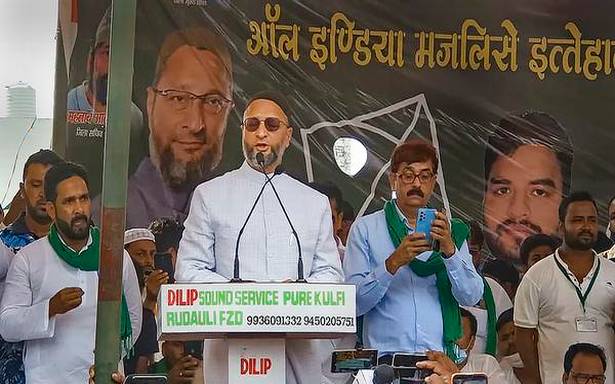The Muslim-Yadav combination is the bedrock of the Samajwadi Party’s traditional electoral arithmetic in Uttar Pradesh.
All India Majlis-e-Ithehadul-Muslimeen president Asaduddin Owaisi is trying to dismantle the Muslim-Yadav combination, the bedrock of the Samajwadi Party’s traditional electoral arithmetic in Uttar Pradesh, in his bid to tap into the discontent among the minority for playing “ second-fiddle” in the equation over the last few decades.
While Muslims are around one-fifth of the state’s population, the Yadavs (OBC) are estimated to be much less at around 9-10%. For any success in 2022, the Samajwadi Party (SP) would need to consolidate these two communities in addition to winning support from others.
To woo Muslims to his party ahead of the 2022 U.P. Assembly election, Mr. Owaisi is not only questioning the record and silence of the non-BJP parties on issues critical to the community and their security but specifically trying to break the ‘M-Y’ combination by creating distrust among Muslims towards the SP. He is doing this by questioning the loyalty of the SP’s core support base of the Hindu Yadav community, to which SP chief Akhilesh Yadav belongs.
While the Muslim vote helped Mr. Yadav and his father Mulayam Singh become Chief Minister, Muslims had to make do with jobs of santris (sentry) and chaprasis (watchmen), he said. He reduced Mr. Yadav as a leader of Yadavs, while claiming to be one of their (Muslims) own.
This was the common pitch in the three public meetings addressed by Mr. Owaisi in Faizabad, Sultanpur and Barabanki between September 7 to September 9.
Mr. Owaisi insinuated that the Yadav voters of the SP, when given a choice vote for the BJP especially when it fields a Yadav candidate. By doing so he also tried to address the common questions his non-BJP opponents raise about his entry into non-traditional fields, prime among them the allegations that the AIMIM will achieve little but divide the Muslim vote, which is precious for non-BJP parties.
If 11% Yadavs can elect a CM, then why can’t 19% Muslims elect 19 MLAs of their own, Mr. Owaisi asked in Barabanki, asking the community to unite.
“If a Yadav votes (for the) BJP, have you ever heard Akhilesh Yadav say that Yadav is a B-team [of BJP]? Did any BSP leader say that a Dalit who voted for Modi was a B-Team,” Mr. Owaisi asked.
The AIMIM leader questioned the non-BJP parties, especially the SP and BSP, for not talking about the consolidation of the “Hindu vote” behind the BJP’s victories as well as poaching of their own core Hindu communities by the BJP, but only focusing on retaining the Muslim vote and accusing him of trying to divide it.
He referred to the 2019 Lok Sabha election, in which the SP and BSP contested together, to state that while these parties were getting an undivided Muslim vote, they did not introspect why Hindu communities were choosing the BJP instead of them.
Using rhetoric packed with emotion and religious symbolism, he appealed Muslims to “break the chains” of the non-BJP parties, the SP-BSP and the Congress, and see the AIMIM as an alternative. He also lamented over being treated as an "untouchable" by the non-BJP parties, as they maintain distance from the AIMIM.
“When our Hindu brothers voted for the BJP, did Akhilesh ever say that the Hindu vote is getting divided and that’s why we lost? Have you ever heard the BSP leader say that the Dalit samaj didn’t vote for her hence the BJP won? How dare they say that if they don’t get Muslim votes the BJP will win? Are Muslims your prisoners? Are you (Muslims) their slaves,” Mr. Owaisi asked.
In Faizabad’s Rudauli, close to Ayodhya, where Mr. Owaisi began his latest campaign, he claimed that the “secular parties” were now even scared of mentioning the Babri Masjid demolition. Referring to the Assembly result in 2017, he claimed that the Yadavs in Rudauli had voted for the BJP’s Yadav candidate and not for the SP’s Muslim candidate, who lost by a bigger margin than in 2012. He made similar claims in Sultanpur and Barabanki.
As Mr. Owaisi expands his campaign in U.P., he is bound to encounter the question, whether his goal is to fight the BJP or does he simply want to increase his own presence even at the cost of dividing the non-BJP votes in an already crowded space?
“No doubt we need to defeat firqaparasti (fanaticism). But it doesn’t mean that to defeat firqaparasti, you are yourself defeated. Defeating firqaparasti means you would have to win, only then the BJP will be defeated,” he said.
Mr. Owaisi said that his outfit has a stronger organization now than it had in 2017, when the party fielded two-dozen odd candidates in U.P. but with no results. While the non-BJP parties treat Muslims merely as votes, the AIMIM wants to provide them an independent political voice and leadership, he argued.
"There is no value for your vote, your tears or your issues," said Mr. Owaisi, who referred to himself as their "brother and son."
Mr. Owaisi faces the challenging task of tapping into the feeling of discontent among Muslims towards the non-BJP parties, especially the SP and BSP, while rallying them against the BJP electorally in an effective manner.
In 2022, the party is preparing to contest 100 seats.
The AIMIM knows well that it cannot win on Muslim vote alone, especially in the post-2014 scenario, when the polarisation of the Hindu communities towards the BJP has almost made the Muslim vote inconsequential. It also lacks the width and strength of the organisation of the SP and BSP.
However, for now, Mr. Owaisi’s entry, backed by his powerful rhetoric and connect with Muslims issues set against the silence of the main Opposition parties for fear or polarisation, will surely ring alarm bells for them.
Source: Read Full Article

